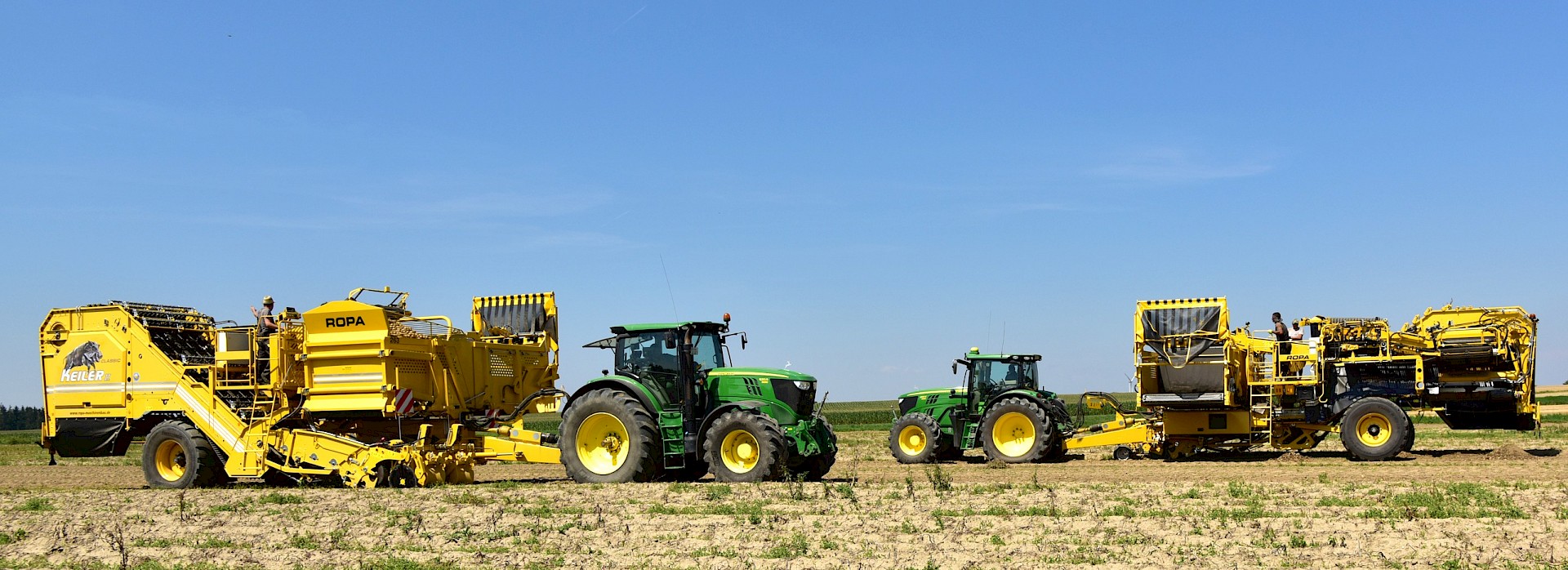The potato harvest is in full swing at the two-generation operation of Peter Großmann-Neuhäusler. This is already routine for the well-rehearsed team – but new this season are two ROPA Keilers, which harvest the organic potatoes. The operation is completely mechanized for the planting, care, and harvest of the fields and, thanks to new investments, offers storage capacities for approx. 8,000 t of potatoes. In total, between 40 and 60 seasonal workers are employed at peak times for harvest, care, and storage work.
Overall, the operation farms approx. 500 ha of land purely organically; the crops include grain, potatoes, sugar beets, legumes, clover grass, and field crops. For 27 years, Großmann has avoided all chemical pesticides and mineral nitrogen fertilizers and gladly tackles the challenge of producing the best-quality vegetables organically. Among the 250 ha field crops, there are approx. 150 ha of potatoes planted, making them the most important crop for the operation. It is primarily the tasty table potatoes of the Princess, Ditta, and Belana varieties that are planted. At Großmann, the focus is on producing the best-quality goods, which are made into french fries and baby food for the well-known manufacturer "HiPP."
To do justice to consumers' high requirements, this family-owned farm selected two Keiler 2 models, one in the Classic variant with the two pintle-belt cleaning system. From this, Georg Großmann, who among other things is responsible for mechanical technology on the farm, is hoping for the gentlest treatment of the harvested crops with low cleaning requirements. This is especially important for potato storage, since some of the crop harvested has to be stored until April of the following year.
Especially for special crops, the Keiler Classic can exploit the benefits of its generous space on the sorting platform. Here, there is space for up to 8 people, who separate the potatoes from the leaves in the fields. For optimal cleaning under difficult conditions and with heavy soil, Großmann Agrar made a conscious decision with the Keiler 2. With its four pintle belts, which can be adjusted individually so they are very gentle, optimal cleaning of the tubers is ensured.
The quick-change system for switching between row pickup and swath pickup is especially appreciated. Since sugar beets, red beets, and many other types of vegetables are also grown, sometimes the attachments have to be changed several times a day – no problem thanks to ROPA's practical pickup system. Within a very short time, the pickup attachment can be changed without requiring any special tools. Großmann’s Keilers were equipped with the proven ridge roller attachments including ridge roller pressure regulation and relief, swath pickups, and a prototype pickup.
Pre-series skids
Großmann Agrar is conducting practical testing of a newly developed pre-series pickup without ridge rollers, which is placed in depth and row across skids – for innovation and extensive testing are writ large at ROPA. According to the motto "from practical application for practical application," technical innovations are constantly being integrated into these reliable machines. The claim of this Lower Bavarian manufacturer of potato technology is, together with practitioners, to test newly developed machine features under all conditions before these are produced in series and sold internationally. At Großmann Agrar, both pickups are compared under the same conditions and enhanced.
This system without ridge rollers makes a special contribution to gentle product handling since the ridges are not also compressed. On stony soil, the lack of ridge pressure means that especially sharp-edged stones can no longer damage the tubers in the ground. The new pickup will probably be available for the coming 2021 season.
Furthermore, the yellow harvesters can score points thanks to their good accessibility for maintenance work and cleaning. In addition, the fully hydraulic drive of these machines wins people over, so that it is possible to work at low speed and thus with low fuel consumption. In field deployment, two John Deere 6Rs were used, the 6150 R and 6210 R, which both required significantly less than 10 l of fuel per hour on average.
To the piece for Bavarian radio about the Großmann farm on 09/21/2018











